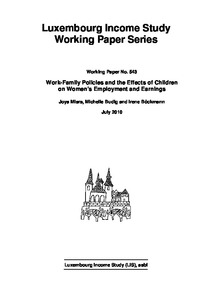Work-family policies and the effects of children on women's employment and earnings
"Welfare state generosity around work-family policies appears to have somewhat contradictory effects, at least for some measures of gender equality. In particular, it appears that as work-family policies, in encouraging higher levels of women?s labor market participation, have also contributed...
| Main Authors: | , , |
|---|---|
| Institution: | ETUI-European Trade Union Institute |
| Format: | TEXT |
| Language: | English |
| Published: |
Luxembourg
2010
LIS |
| Subjects: | |
| Online Access: | https://www.labourline.org/KENTIKA-19183648124919018209-Work-family-policies-and-the-e.htm |
| Summary: | "Welfare state generosity around work-family policies appears to have somewhat contradictory effects, at least for some measures of gender equality. In particular, it appears that as work-family policies, in encouraging higher levels of women?s labor market participation, have also contributed to higher levels of occupational gender segregation, and to lower wage-levels for women relative to men. We examine these apparent contradictions, and consider how they may differ based on particular policies, or on the effects of policies on the employment outcomes of particular groups of women. We emphasize how policies relate to employment and earnings outcomes among women, structured by their responsibilities for children. Moreover, we separate policies to consider their potentially unique relationships with women?s employment and earnings (for example, parental leave versus childcare. With a few exceptions analyses use Wave 5 (representing the years 2000/2001) of the LIS data for 21 countries. For all countries, the sample is restricted to employed adult women, age 25 to 45 (prime years for childrearing), who are not self-employed and not in military service. We investigate: (1) differences in employment hours and earnings for women, based on their number of children in a broad range of countries across Eastern and Western Europe, North America, Israel, and Australia and (2) the distinct associations of maternity, paternity, and parental leaves, publicly funded child care for very young (0 to 2 years) and for older (3 to 5 years) children with estimated earnings and employment penalties. We show the importance of considering policy outcomes, recognizing the potentially countervailing consequences of different kinds of family policies. We believe that is crucial to recognize that inequalities among women, related to their care of children, are important, particularly when a significant proportion of women are forgoing motherhood in many of these countries. Our analyses also suggest the importance of designing effective leave policies ? that promote parental attachment to the labor force rather than ?cooling out? parents, and public provisioning for high quality, employment-enabling childcare. " |
|---|---|
| Physical Description: | 33 p. Digital |

